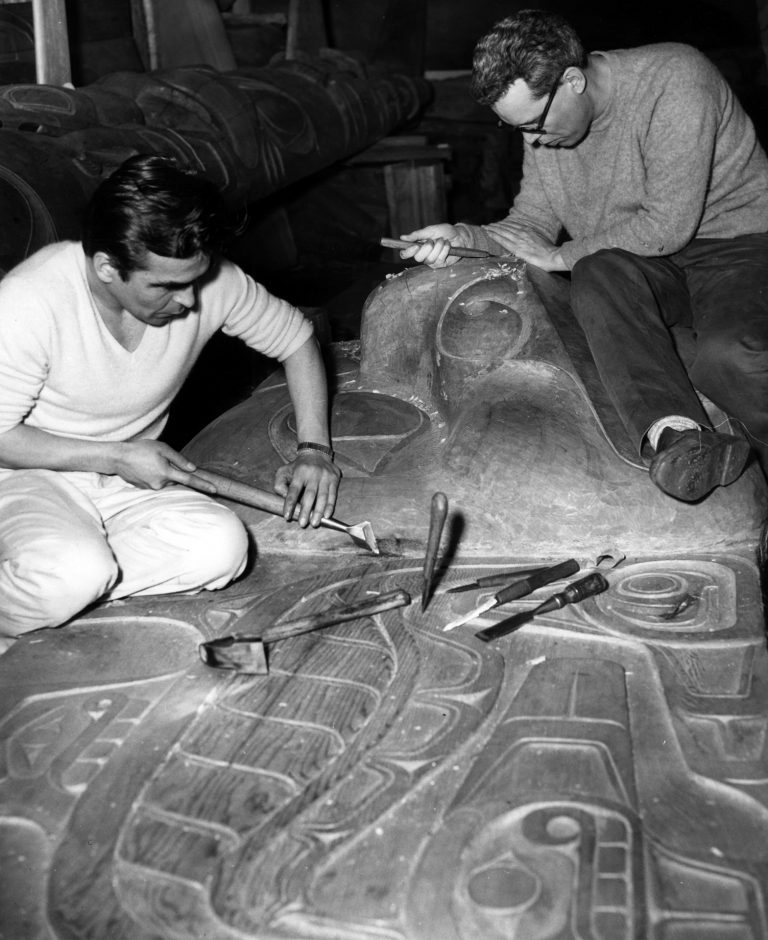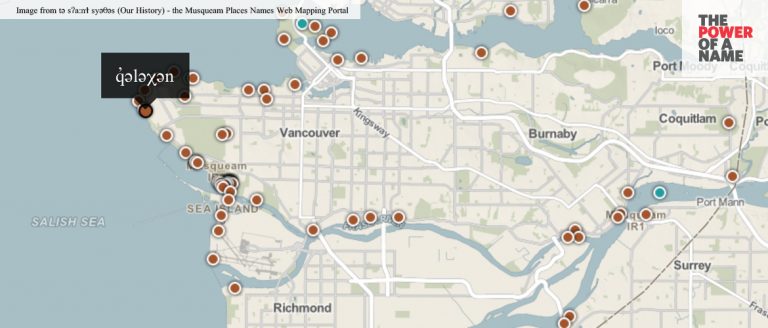“The Power of a Name” is a film series that examines the contested history of naming practices at UBC’s first year student residence, Totem Park, and features stories of relationships between UBC and Indigenous communities. It encourages members of the university community to think critically about their relationships to the unceded lands of the Musqueam people on which we are privileged to study, work, and live.
Two new films for the series have recently been released on UBC’s Youtube channel: “The Thunderbird and UBC” and “Haida Village at the Museum of Anthropology”. These films explore histories that are not widely known to the UBC community or visitors to campus.
The first two films in the series were produced in collaboration with the Musqueam Nation and share stories about the lands where the university is located. In 2011, the two newest Totem Park buildings were gifted the names həm̓ləsəm̓ and q̓ələχən by Musqueam through a collaborative naming process. These place names are significant to Musqueam, on whose territory UBC and Metro Vancouver are located. The Musqueam language, hən̓q̓əmin̓əm̓, is one of 34 critically endangered First Nations languages in what is now British Columbia. Introductory to advanced hən̓q̓əmin̓əm̓ language courses are offered through the First Nations and Endangered Languages Program in partnership with the Musqueam community.
The area that Totem Park Residence occupies today used to be the site of an outdoor exhibit displaying different works by Bill Reid and Douglas Cranmer called “Totem Park.” The original six houses that became residences were named without community consultation, and the names Haida, Shuswap, Nootka, Dene, Salish, and Kwakiutl have been used since the 1960s without permission and without context. This has led to many disrespectful acts of misrepresentation and appropriation.

Bill Reid and Douglas Cranmer carving the frontal board of the Haida mortuary pole for Totem Park in 1961. Image Source: University of British Columbia Archives, [UBC 1.1/13183]
The Power of a Name films allow for the opportunity to break down stereotypes and misconceptions held by members of the UBC community and beyond. Furthermore, they also allow for Indigenous communities to represent themselves and share information of their own term. For instance, the house named Kwakiutl actually comes from a misnomer. Kwakiutl is an outdated, incorrect and inaccurate name for Kwakwa̱ka̱ʼwakw that comes from anglicizing Kwaguith. Kwaguith is the correct name, and only one group of the sixteen tribes of the Kwakwa̱ka̱ʼwakw people.
Films such as the “The Thunderbird and UBC” highlight some of the commitments and responsibilities that UBC has to Indigenous communities, particularly in regards to respectful representation. Around the mid-1930s, athletic teams at UBC had started referring to themselves as the Thunderbirds. As told by her granddaughter Lou-Ann Ika’wega Neel, Ellen Neel, who was a Kwakwa̱ka̱ʼwakw carver, wanted UBC to have the name legitimately through her community’s legal system. Neel consulted with her family and they decided to share a traditional story which inspired her carving of the “Victory Through Honor” totem pole and the gifting of this pole and the thunderbird name in 1948. A replica pole, carved by Calvin Hunt, Mervin Child, and John Livingston and raised at a rededication ceremony in October 2004, is now located outside of Brock Hall. Ellen’s daughter Theresa reflected on her mother’s greater vision for the university: “I know a great purpose for offering that pole to the university, and my mother’s heart, was for this university to open their doors, and be welcoming to Aboriginal students, and she had a great love and passion for all people, and she believed that we all needed to work together to come to the future that we’re at now.”
“The Power of a Name” videos that are currently available can be accessed on the Centre for Teaching, Learning and Technology Indigenous Initiatives’ YouTube playlist. The project website is currently under development.
For more information, please contact the developer of the series, Sarah Ling at sarah.ling@ubc.ca.
To learn how to implement The Power of a Name resources into your courses or workshops, please contact amy.perreault@ubc.ca
